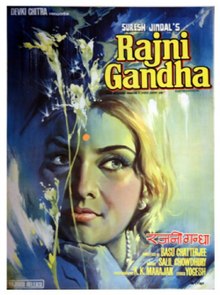| Revision as of 20:52, 22 August 2009 editMakrandjoshi (talk | contribs)848 edits →Soundtrack: making it more NPOV, too much fawning here. Also some grammatical corrections.← Previous edit | Revision as of 20:56, 22 August 2009 edit undoMakrandjoshi (talk | contribs)848 edits grammatical corrections and removing irrelevant informationNext edit → | ||
| Line 30: | Line 30: | ||
| It starred ], ] and ] in the leading roles. "Rajnigandha" won the Best Picture at the ] in the year 1974, both the Popular Award and the Critics Award. | It starred ], ] and ] in the leading roles. "Rajnigandha" won the Best Picture at the ] in the year 1974, both the Popular Award and the Critics Award. | ||
| "Rajnigandha" was considered as a |
"Rajnigandha" was considered as possessing a realistic outlook on cinema in 1974 in an era when potboilers were ruling over ]. The film was the first screen role of ], and first Hindi film of ], both of whom went on to worked with ] in many subsequent films. | ||
| ==Plot Summary== | ==Plot Summary== | ||
| Deepa (]) is a graduate student in Delhi and is in a long-term relationship with Sanjay (]), whom she plans to marry. Sanjay is a loquacious, humorous, and a nice individual, but also rather lackadaisical and forgetful with no sense of punctuality. A job interview call from a college in Mumbai reacquaints her with Navin (]), a former boyfriend whom she split with under acrimonious circumstances. Navin is in every way |
Deepa (]) is a graduate student in Delhi and is in a long-term relationship with Sanjay (]), whom she plans to marry. Sanjay is a loquacious, humorous, and a nice individual, but also rather lackadaisical and forgetful with no sense of punctuality. A job interview call from a college in Mumbai reacquaints her with Navin (]), a former boyfriend whom she had split up with under acrimonious circumstances. Navin is in every way the anti-thesis of Sanjay by being very punctual and catering to her needs during her stay, including showing her a good time in the city and helping her with the job interview. This rejuvenates Deepa's feelings for him and she finds herself torn between the two men, and between her past and her present. | ||
| ==Soundtrack== | ==Soundtrack== | ||
Revision as of 20:56, 22 August 2009
- Rajnigandha may also refer to Rajnigandha, the flower, also known as tuberose.
| Rajnigandha | |
|---|---|
 | |
| Directed by | Basu Chatterjee |
| Written by | Manu Bhandari (story) Basu Chatterjee (Screenplay & dialogue) |
| Produced by | Suresh Jindal |
| Starring | Amol Palekar Vidya Sinha Dinesh Thakur |
| Cinematography | K.K. Mahajan |
| Edited by | G.G. Mayekar |
| Music by | Salil Choudhury Yogesh (Lyrics) |
| Release date | 1974 |
| Running time | 110 min. |
| Country | India |
| Language | Hindi |
Rajnigandha (रजनीगन्धा) is the name of a Hindi movie released in 1974 and directed by Basu Chatterjee, and based on story, " Yehi Sach Hai" (This is the Truth) by noted Hindi writer, Manu Bhandari .
It starred Amol Palekar, Vidya Sinha and Dinesh Thakur in the leading roles. "Rajnigandha" won the Best Picture at the Filmfare Awards in the year 1974, both the Popular Award and the Critics Award.
"Rajnigandha" was considered as possessing a realistic outlook on cinema in 1974 in an era when potboilers were ruling over Bollywood. The film was the first screen role of Vidya Sinha, and first Hindi film of Amol Palekar, both of whom went on to worked with Basu Chatterjee in many subsequent films.
Plot Summary
Deepa (Vidya Sinha) is a graduate student in Delhi and is in a long-term relationship with Sanjay (Amol Palekar), whom she plans to marry. Sanjay is a loquacious, humorous, and a nice individual, but also rather lackadaisical and forgetful with no sense of punctuality. A job interview call from a college in Mumbai reacquaints her with Navin (Dinesh Thakur), a former boyfriend whom she had split up with under acrimonious circumstances. Navin is in every way the anti-thesis of Sanjay by being very punctual and catering to her needs during her stay, including showing her a good time in the city and helping her with the job interview. This rejuvenates Deepa's feelings for him and she finds herself torn between the two men, and between her past and her present.
Soundtrack
The music director of this film was Salil Chaudhury, and the soundtrack was commercially successful. Two popular tracks were the title song, "Rajnigandha Phool Tumhaare" sung by Lata Mangeshkar, and the Mukesh single, "Kai Baar Yuheen Dekha hai," for which he won the National Film Award for Best Male Playback Singer.
References
- Rajnigandha story
- Yahi Such Hai, story www.abhivyakti-hindi.org.
External links
This article about a Hindi film of the 1970s is a stub. You can help Misplaced Pages by expanding it. |
This article about a romantic comedy film is a stub. You can help Misplaced Pages by expanding it. |
| Awards | ||
|---|---|---|
| Preceded byAnuraag | Filmfare Award for Best Film 1974 |
Succeeded byDeewar |
| Preceded byDuvidha | Filmfare Critics Award for Best Movie 1975 |
Succeeded byAandhi |